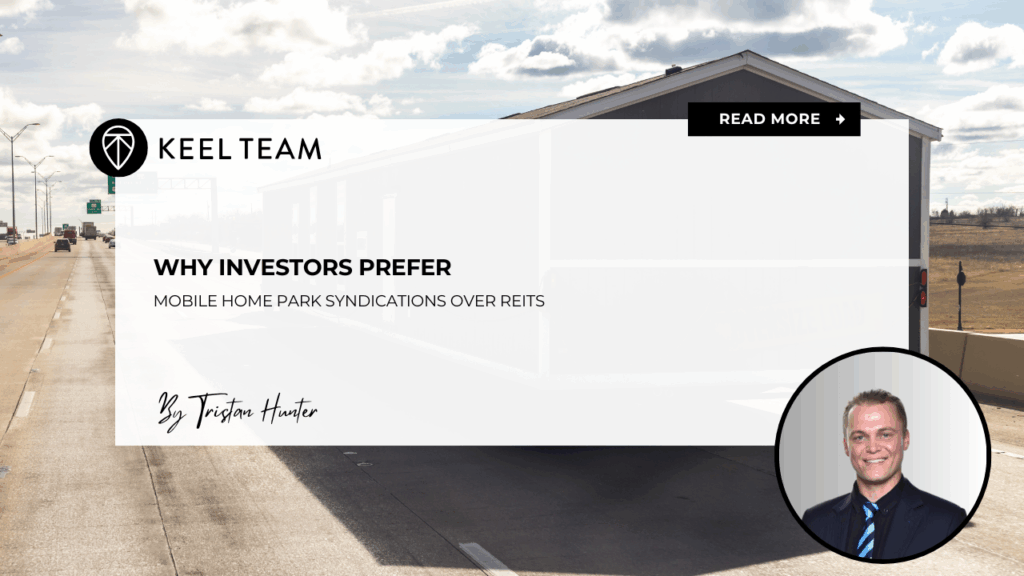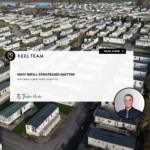Why Investors Prefer Mobile Home Park Syndications Over REITs
-
 Tristan Hunter - Investor Relations
Tristan Hunter - Investor Relations

Investors exploring the affordable housing sector often compare two common approaches: buying shares in a publicly traded real estate investment trust (REIT) or participating in a private mobile home park syndication. Both offer exposure to a demand-heavy asset class, yet they operate differently, attract different investor profiles, and create different expectations. While neither option guarantees specific results, many investors seem to lean toward private mobile home park syndications because they often prefer the control, transparency, and structure these offerings may provide.
This article outlines several reasons behind that preference, while keeping in mind that every investment strategy carries risk and requires proper due diligence.
Understanding the Two Investment Paths
REIT Exposure
A publicly traded real estate investment trust can give investors a liquid, stock-like way to gain exposure to mobile home communities. These companies usually own large portfolios of communities across multiple states. They come with professional management, corporate reporting, and exchange-traded liquidity.
Private Mobile Home Park Syndication Exposure
A private mobile home park syndication typically involves a sponsor acquiring one or more mobile home communities and inviting passive investors to participate in the ownership. These offerings usually operate under exemptions such as Regulation D. Investors receive direct interest in the underlying property or partnership, depending on the structure.
Both options may create opportunities, but the reasons many investors prefer private mobile home park syndications revolve around several core advantages that REITs sometimes do not offer.
Download our FREE eBook on the Top 20 things to know BEFORE investing in mobile home parks!
Direct Ownership Exposure May Appeal to Investors
Many investors appreciate that a private mobile home park syndication may give them ownership participation in a specific property rather than exposure to a large corporate portfolio. This distinction can matter for several reasons.
More Ability to Evaluate a Single Asset
When investors participate in a private mobile home park syndication, they often review detailed information about one property (or a clearly identified group of properties). They may examine:
- Utility systems
- Occupancy trends
- Home inventory mix
- Market rents
- Local demand drivers
- Expense history
This level of insight may help investors decide whether the specific mobile home community matches their risk tolerance.
A REIT, on the other hand, usually pools many properties into one corporate structure. Investors buy into the entire portfolio rather than one community. The individual performance of each community may not be as visible, which some investors consider a drawback.
Potential for More Targeted Strategies
Some private mobile home park operators focus on value-add opportunities, infill, utility upgrades, or operational optimizations. Investors who want exposure to that narrower strategy may feel that a private mobile home park syndication lets them align more closely with the operator’s plan.
REITs often operate at a national scale, which means their strategies sometimes prioritize stability and long-term portfolio growth rather than individual value-add moments.
Financial Structure Differences Attract Certain Investors
There are structural differences between REITs and private mobile home park syndications that many investors consider important.
Potential Income Distribution Preferences
Private mobile home park syndications often use preferred returns or structured distribution waterfalls. While these returns are never guaranteed, some investors appreciate the way syndications outline the order of distributions. This structure may help investors understand where they stand in the hierarchy.
REITs, meanwhile, pay dividends based on overall portfolio performance and board approvals. The dividend level could fluctuate based on corporate decisions, market conditions, or overall earnings, which may feel less predictable for some investors.
Tax Treatment May Differ
Private mobile home park syndications often pass through depreciation to investors. Because mobile home communities typically contain significant depreciation components, some investors appreciate the tax-efficient nature of these pass-throughs. However, actual outcomes may vary widely by deal and investor profile.
REIT dividends, by contrast, often include portions treated as ordinary income. Investors sometimes view this as less tax-advantageous, although personal circumstances vary.
Opportunity for Capital Event Participation
Many private mobile home park syndications involve refinancing, disposition, or recapitalization events. Investors sometimes prefer this potential upside participation. Yet every deal functions differently, and no event is guaranteed.
A REIT usually reinvests capital across its entire portfolio or distributes dividends according to internal policy. Investors do not participate directly in individual asset events.

Some Investors Prefer the Operational Transparency of Syndications
Operational clarity is another area where private mobile home park syndications often stand out. Sponsors typically share regular reporting, financial updates, and project-level details. Investors may receive insight into:
- Occupancy changes
- Rent collections
- Infill progress
- Capital expenditures
- Operational improvements
- On-the-ground challenges
Because mobile home community operations can significantly influence performance, this visibility can help investors feel more connected to the asset.
In contrast, REIT financials are presented in aggregate form. They provide corporate-level reporting designed for a broad shareholder base. While this reporting is structured and audited, it may not offer investors a clear view into what is happening inside any specific mobile home community.
Potential for Stronger Alignment With Operators
Direct Access to the Syndicator
Investors often value the opportunity to speak directly with the mobile home park operator or investor relations team. They can ask questions, understand the reasoning behind decisions, and stay informed about changes.
REITs, due to their size and regulatory constraints, rarely offer that level of direct interaction.
Incentives May Be More Closely Aligned
Private mobile home park syndicators usually earn performance-based compensation. This may create a sense of alignment. The better the property performs, the more the sponsor may earn. While this structure is common, every offering has unique terms. Investors still need to examine them carefully.
REITs, however, typically pay their executives through salary and corporate incentives. While these may link to long-term performance, they are less tied to individual property results.
Flexibility Appeals to Certain Investor Profiles
Private mobile home park syndications often involve a fixed business plan with a clear path for operational improvements, revenue growth, or value-creation opportunities. Some investors prefer this type of focused plan.
Possibility of Value-Add Participation
A syndication may include:
- Infill of vacant lots
- Utility upgrades
- Home renovation plans
- Community repositioning
- Operational system improvements
These value-add efforts can influence both income and long-term valuations. Investors who want exposure to these activities sometimes feel that private mobile home park syndications offer more targeted opportunities than REITs.
Less Sensitivity to Public Market Fluctuations
Another point investors often raise is the disconnect between real estate fundamentals and stock market pricing. A REIT trades like a stock, which means share prices may rise or fall due to broad market sentiment rather than the actual performance of mobile home communities.
Private mobile home park syndications are not priced daily by market conditions. Although this means they are illiquid, some investors prefer the focus on underlying property performance rather than market volatility.
Final Thoughts
Both private mobile home park syndications and mobile home park REITs offer exposure to an asset class supported by ongoing demand for affordable housing. Neither path is universally better, and each carries its own risks and responsibilities. However, many investors appear to prefer private mobile home park syndications because they appreciate direct ownership exposure, tax-advantaged structures, operational transparency, and the alignment that often exists between sponsors and investors.
Investors should review each opportunity carefully, evaluate the track record of the operator, and consider their own financial situation before deciding which approach fits their goals. When approached thoughtfully, both strategies may serve as useful ways to participate in mobile home community investing.
Are you looking for MORE information? Book a 1-on-1 consultation with Andrew Keel to discuss:
- A mobile home park deal review
- Due diligence questions
- How to raise capital from investors
- Mistakes to avoid, and more!
Disclaimer:
The information provided is for informational purposes only and is not investment advice or a guarantee of any kind. We do not guarantee profitability. Make investment decisions based on your research and consult registered financial and legal professionals. We are not registered financial or legal professionals and do not provide personalized investment recommendations.

Tristan Hunter - Investor Relations
View The Previous or Next Post
Subscribe Below 👇





